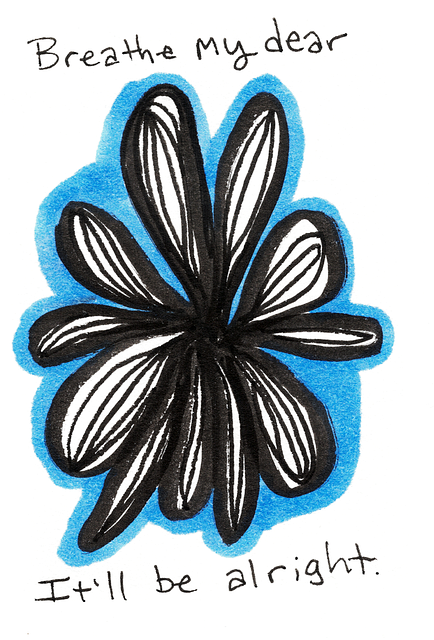Substance abuse in Highlands Ranch is addressed through Eye Movement Desensitization and Reprocessing (EMDR) therapy, which targets traumatic memories and negative thought patterns linked to drug or alcohol misuse. Combining EMDR with mental wellness coaching offers a holistic path towards recovery, enhancing overall mental health. This evidence-based approach, along with self-care practices like regular exercise, balanced nutrition, and stress management techniques, equips individuals with tools to manage cravings and avoid triggers, fostering sustained sobriety.
Substance abuse poses significant risks, impacting physical and mental health, relationships, and overall well-being. Understanding these dangers is the first step towards change. This article explores comprehensive risk reduction strategies, focusing on the power of Highlands Ranch EMDR Therapy as a proven tool to address underlying issues. We’ll also delve into additional long-term recovery methods, providing a holistic approach to prevent future substance abuse and foster lasting healing.
- Understanding Substance Abuse and Its Risks
- Highlands Ranch EMDR Therapy: A Powerful Tool for Risk Reduction
- Additional Strategies for Long-Term Recovery and Prevention
Understanding Substance Abuse and Its Risks

Substance abuse is a complex issue that involves the harmful use of drugs or alcohol, leading to adverse effects on an individual’s health, relationships, and overall well-being. It’s crucial to understand that this isn’t just about lack of willpower; it’s often rooted in underlying mental health issues, trauma, or stress. In Highlands Ranch, EMDR therapy has emerged as a powerful tool for addressing these complex roots. Eye Movement Desensitization and Reprocessing (EMDR) is an evidence-based therapeutic approach designed to help individuals process traumatic memories and emotional distress, thereby reducing the intensity of associated feelings and beliefs.
By integrating this method with other emotional healing processes, such as mental wellness coaching programs, individuals can embark on a journey towards recovery and improved mental health. EMDR therapy helps to desensitize clients to distressing memories or thoughts related to substance abuse, while also teaching them new ways of coping and enhancing their overall mental wellness. This multifaceted approach not only addresses the symptoms but also gets to the core of why someone might be turning to substances as a coping mechanism in the first place.
Highlands Ranch EMDR Therapy: A Powerful Tool for Risk Reduction

Highlands Ranch EMDR Therapy offers a groundbreaking approach to risk reduction for substance abuse. This therapeutic method, short for Eye Movement Desensitization and Reprocessing, has proven highly effective in addressing the root causes of addictive behaviors. By combining guided eye movements with cognitive therapy, it helps individuals process traumatic memories and negative thought patterns associated with drug or alcohol misuse. Through this process, patients can gain a deeper understanding of their past experiences, build empathy for themselves, and develop healthier coping mechanisms.
The approach goes beyond traditional talk therapy by engaging both the mind and body in the healing process. This not only enhances the effectiveness of treatment but also fosters a stronger sense of self-awareness and emotional resilience. By integrating conflict resolution techniques and confidence-boosting exercises into the EMDR framework, individuals can learn to navigate challenges without resorting to substance abuse. As a result, Highlands Ranch EMDR Therapy equips patients with powerful tools for long-term risk reduction and improved overall well-being.
Additional Strategies for Long-Term Recovery and Prevention

In addition to evidence-based treatments like Highlands Ranch EMDR Therapy, establishing robust self-care practices is integral for long-term recovery from substance abuse. This involves cultivating healthy habits such as regular exercise, balanced nutrition, and sufficient sleep. Engaging in activities that promote relaxation, like mindfulness meditation or yoga, can also help individuals manage cravings and stress effectively. By prioritizing self-care, individuals build resilience against triggers and emotional turmoil, fostering a foundation for sustained sobriety.
Furthermore, integrating effective stress management techniques into daily routines is crucial for preventing relapse. This might include practicing crisis intervention guidance, such as deep breathing exercises or cognitive reframing strategies, when faced with stressful situations. Support groups or therapy sessions can also provide valuable tools for navigating high-risk scenarios and fostering a sense of community and accountability. By equipping individuals with the skills to manage stress and cope with challenges constructively, these strategies enhance their ability to maintain recovery over the long term.
Substance abuse carries significant risks, but with the right strategies, recovery and prevention are achievable. By understanding the complexities of substance abuse and its impacts, individuals can take proactive steps towards a healthier future. One powerful tool highlighted in this article is Highlands Ranch EMDR Therapy, which has proven effective in reducing risk factors associated with substance abuse. Combining this therapy with additional long-term strategies, such as support groups and lifestyle changes, creates a robust framework for recovery and a lasting, positive impact on well-being.














